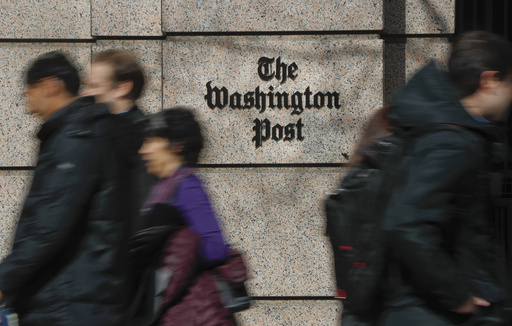
The landscape of newspaper endorsements for presidential candidates has shifted dramatically, especially in light of financial challenges faced by the industry over the last twenty years. Many owners have opted to avoid endorsing candidates, fearing it might alienate subscribers amid an increasingly polarized political atmosphere.
However, in a surprising turn of events last week, both The Washington Post and the Los Angeles Times sparked considerable backlash from their readership for deciding against endorsing any candidates. This backlash persisted through Monday as Jeff Bezos, owner of the Post, felt compelled to publicly justify the decision in the newspaper’s own columns. His remarks came alongside resignations from three editorial board members and pleas from staff journalists urging readers to refrain from canceling their subscriptions, despite reports indicating that thousands had already done so.
Bezos described the decision to forgo endorsements as a principled move, suggesting that readers do not prioritize such statements and often perceive them as signs of bias. This clarification followed a report indicating that more than 200,000 subscriptions could have been canceled, which would represent a significant setback for The Washington Post, a publication that, despite having over 2.5 million subscribers last year, continued to experience financial losses and a reduction in staff. The Post declined to comment on this subscription cancellation report.
In recent days, both newspapers have acknowledged losing a substantial number of subscribers attributed to their non-endorsement stance. Initially, they had prepared to endorse Democrat Kamala Harris but ultimately decided against it under the guidance of Bezos and LA Times owner Patrick Soon-Shiong. The Post’s publisher, Will Lewis, framed the decision as empowering readers to form their own opinions. Nevertheless, the timing of their announcement, made close to Election Day, led to accusations that the decision was motivated by a desire not to antagonize former President Trump should he regain power. John Woolley from the University of California-Santa Barbara remarked that it seemed neither principled nor well-timed.
Retired editor Martin Baron criticized the newspapers for what he deemed a lack of courage, suggesting that the decision might embolden Trump. Historically, newspapers have engaged openly in political discourse, and endorsements have played a crucial role. In the 1800s, newspapers openly supported specific parties, and even into the early 2000s, many major newspapers openly endorsed candidates. However, the trend has shifted dramatically over recent elections, with a noted decline in official endorsements. By 2020, only 54 out of the 100 largest newspapers made any endorsements for president, a decrease from 92 in 2008. Woolley noted that this cycle, there are likely even fewer endorsements on the horizon.
Many studies indicate that endorsements have little effect on readers, particularly in the digital age, where distinctions between objective reporting and opinion pieces are often blurred. Centralized ownership structures have also diminished local editorial control. The prevailing mentality has shifted towards avoiding any actions that might alienate subscribers. As Rick Edmonds, a media analyst, explained, the approach now often favors not making endorsements at all.
Despite the broader trend toward neutrality, the reactions from the Post and the Los Angeles Times have highlighted a discontent among liberal readerships. During the Trump administration, the Post’s subscriber base surged due to its vigorous political reporting. However, recent developments have summoned criticism from various quarters. Prominent journalists, including legends from the Watergate era, along with columnists, have publicly condemned the decision to abstain from endorsements.
In addition, Los Angeles Times writer Karin Klein expressed her disapproval openly in social media, criticizing the Late decision to withhold endorsements, which she felt contradicted the supposed neutrality of the publication. Bezos, reflecting on the situation, admitted that he wished the endorsement policy had been changed sooner to avoid the election’s emotional turmoil causing further backlash. The Post’s website saw a flood of comments from subscribers announcing their cancellations, including discontent even from some political figures.
As concerns mount regarding the potential impacts of subscription losses on future journalism employment, industry voices emphasize the broader implications of audience backlash. The union representing Los Angeles Times staff voiced unease over potential job losses resulting from subscription cancellations, while Post columnist Dana Milbank warned that reduced subscriptions could harm quality journalism across the board.
In light of this controversy, some comments suggested that a more impactful protest might involve boycotting Amazon, rather than impacting journalism through subscriptions. Milbank also indicated mixed feelings regarding Bezos’s influence, noting that during his tenure as a columnist, he had never been stifled. Bezos echoed this sentiment, asserting that he had never attempted to use his power for personal gain concerning the newspaper’s editorial direction.
Contrary to the non-endorsement trend, some newspapers are defying this pattern. The Oregonian, for example, decided to endorse a candidate after remaining neutral in the past elections, highlighting responsiveness to community sentiments. Similarly, The Plain Dealer in Cleveland conducted a poll among editorial board members about endorsements and decided to support Harris, reflecting the expectation of some readers for a clear stance rather than neutrality.
Through these actions, editors are demonstrating a commitment to their readership, highlighting the complexities and challenges newspapers navigate in today’s tumultuous political climate.
